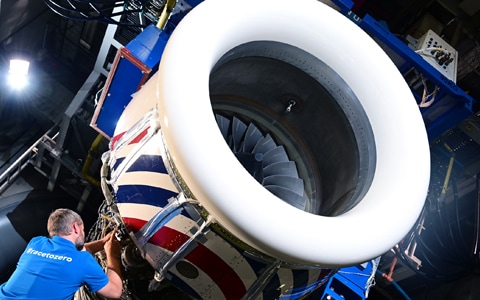Rolls-Royce has succeeded in a series of tests with 100% Sustainable Aviation Fuel on its latest generation of business aviation engines, the Pearl 15 and the Pearl 10X.
The fuel was made from waste-based sustainable feedstocks such as used cooking oils and waste fat, delivering the potential to significantly reduce net CO2 lifecycle emissions by about 80% compared to conventional jet fuel.
Rolls-Royce says its tests demonstrated that its current engine portfolio for large civil and business jet applications can operate with 100% SAF, laying the groundwork for moving this type of fuel towards certification. At present, SAF is certified only for blends of up to 50% with conventional jet fuel. By the end of 2023 Rolls-Royce will have proven that all its in-production Trent and business aviation engines are compatible with 100% SAF.
Dr Dirk Geisinger, Director Business Aviation, Rolls-Royce said: “Sustainable Aviation Fuels are a key element of our sustainability strategy, as they will play an important role in decarbonising long-haul flight. With its outstanding environmental performance, the Pearl family is already setting new standards in the ultra-long-range corporate jet market.”
The Pearl 15, the first member of the Pearl engine family, powers Bombardier’s Global 5500 and 6500 aircraft, while the Pearl 10X will power Dassault’s ultra-long-range flagship aircraft, the Falcon 10X. Tests on the Pearl 700, powering Gulfstream’s G700 and G800 business jets, have already been completed in 2021.
The tests took place at Rolls-Royce’s Business Aviation headquarters in Dahlewitz, Germany, and are part of the company’s ongoing ambition to play a leading role in the journey to achieve net zero flight by 2050.
As well as proving compatibility with 100% SAF another target of the test campaign was to run a back-to-back engine test with both Jet A-1 and SAF on the same Pearl 10X engine. The aim was to confirm further improvements in the environmental footprint when switching to SAF. The results from this first back-to-back engine emission test under standard certification conditions provides important correlations for the evaluation of future SAF within our environmental strategy.
The back-to-back tests conducted with conventional fossil-based fuel and subsequently SAF also confirmed a cleaner combustion of the sustainable fuel, with significantly lower levels of non-volatile particulate matter (nvPM). In combination with the low NOx combustor technology of the Pearl 10X and its additive manufactured combustor tiles a reduction of all emissions was achieved.



